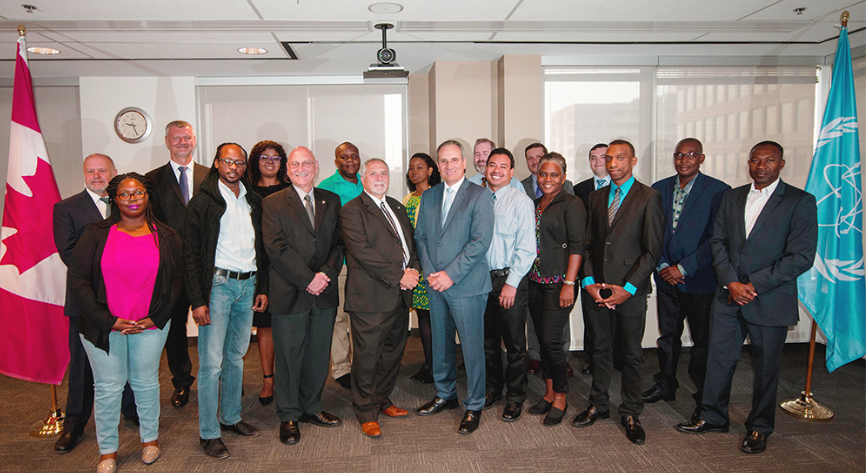Sharing our expertise internationally: providing regulatory training to Caribbean countries
The Canadian Nuclear Safety Commission (CNSC) is strongly committed to engaging in international cooperation activities that foster relationships, strengthen frameworks and share best practices.
From September 11 to October 6, 2017, representatives from nine Caribbean countries participated in classroom and field training hosted by the CNSC in Ottawa. The participants’ commitment to improving nuclear safety for their communities was highlighted by the fact that they made the trip under difficult conditions, when major hurricanes were devastating the Caribbean.
"The collaboration with the International Atomic Energy Agency (IAEA) is integral in ensuring that regulators work towards a global unified approach to the safety of nuclear substances,” said Ramzi Jammal, CNSC Executive Vice-President and Chief Regulatory Operations Officer. “The presence of the trainees in Canada is a testimony to the recognition of the CNSC as a world-class nuclear safety regulator and our aim to be the best nuclear regulator in the world."

Led by CNSC staff, participants received training on a wide range of topics on nuclear safety and the CNSC’s work. These topics ranged from the Code of Conduct on the Safety and Security of Radioactive Sources to the fine details of inspection and investigation of nuclear medicine sources and equipment, nuclear gauges, industrial radiography and safe transport. Participants also had the opportunity to tour the CNSC’s ISO/IEC 17025-2005-accredited calibration laboratory, as well as Health Canada facilities, and to directly speak with and learn from CNSC inspectors.
The course, in partnership with the IAEA, was part of a regional cooperation project RLCA9082, Establishing and Strengthening Sustainable National Regulatory Infrastructures for the Control of Radiation Sources. Participating countries include Haiti, Dominica, Belize, Trinidad and Tobago, Jamaica, Barbados, Guyana, Bahamas, and Antigua and Barbuda.
"Working together to develop and improve competence and expertise of regulatory bodies is key to establishing global nuclear safety," noted Mr. Jammal. "Sharing best practices and lessons learned in nuclear safety will contribute to strengthening relationships and building confidence among nuclear regulators worldwide."
"This is the first-of-its-kind training for the Caribbean," said Saul Perez Pijuan, IAEA Section Head, Division of Technical Cooperation for Latin America and Caribbean. "Thank you to the CNSC for the opportunity to share knowledge. We look forward to seeing the application of what is learned to the work at home."
The CNSC continues to welcome international cooperation and remains eager to share its knowledge and expertise on an international scale.
Page details
- Date modified: